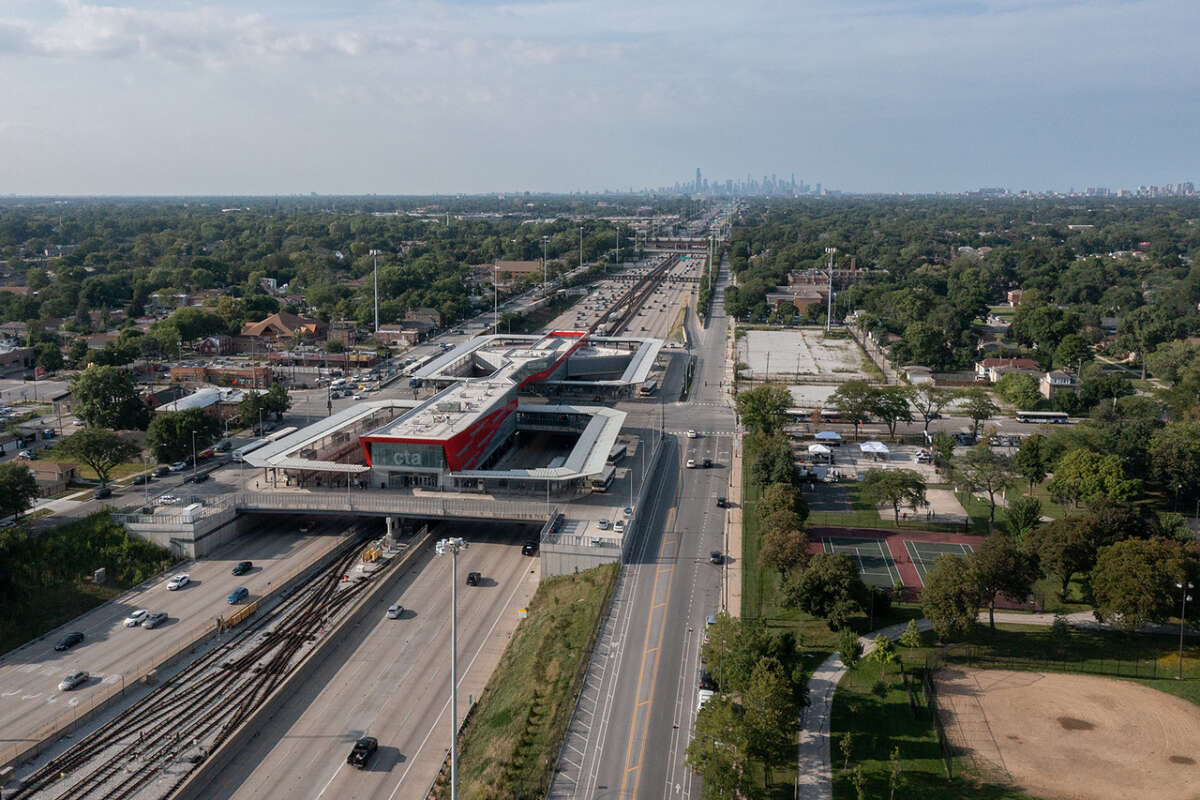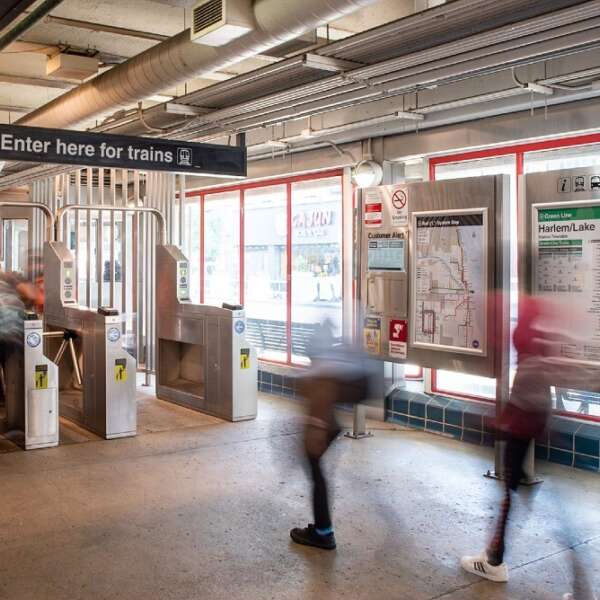Three years into the Infrastructure Investment and Jobs Act, Chicago’s transit system is winning competitive grants and advancing critical projects
March 12, 2024
March 12, 2024

The Infrastructure Investment and Jobs Act (IIJA), passed in 2021, represented a historic level of federal investment for shoring up the nation’s infrastructure, including more than $108 billion in funding for public transit over five years, through 2026. The Chicago region is seizing this opportunity and bringing in more federal funding than ever to improve and expand the regional transit system.
Transit in the Chicago region and across the country has been underfunded for decades, and IIJA recommitted the federal government to investing in transit capital needs. In northeastern Illinois, this has translated to more than $200 million in additional annual formula funding, up to $750 million, distributed to the region and more than double the amount of discretionary funding won compared to the two years prior to IIJA. These increases have allowed critical projects to advance, like the CTA’s All Stations Accessibility Program (ASAP) Plan, new Metra rolling stock, and expansion of Pace’s Pulse rapid transit service.
Federal transit funding comes to the Chicago region in two ways: formula grants and discretionary grants. Historically, the bulk of federal funds and most of the system’s capital funding overall have come from formula grants, which are distributed by the Federal Transit Administration (FTA) annually to transit systems in metro areas based on population, ridership, and service levels, among other considerations. But a growing portion comes via competitive discretionary grants, providing our region with greater opportunities to bring federal dollars to local projects. Discretionary grants also require local matching funds – typically set at 20 percent of the overall project cost – so the Service Boards work hard to identify local and state funds that could be used to access the federal funds. Rebuild Illinois, the state’s most recent capital bill, offered historic levels of state funding for transit in the years immediately before passage of the IIJA so that the Service Boards are well-positioned to take advantage of its discretionary funding opportunities, which now generally account for over 20 percent of the annual capital program.
Due to IIJA, there is more capital funding for transit than ever before, but competition is fierce for discretionary grants as transit agencies across the country aggressively pursue these new resources to meet significant needs. CTA, Metra, and Pace responded by dedicating additional staff and resources to the pursuit of federal grants, with planning assistance and support from RTA. Rebuild Illinois created a dedicated funding stream for transit from the Motor Fuel Tax, referred to as state PAYGO funding, that has stood out as an important source of matching funds and helped to show Illinois’ commitment to delivering projects to the region. This approach has resulted in major wins over the past year and since the passage of IIJA.
The region won $414 million in discretionary grant funding in 2023, a 23 percent increase over 2022 and a 190 percent increase over 2021, the last year of pre-IIJA funding levels.
This does not include the $1.973 billion that CTA is in line to receive from the federal Capital Investment Grants (CIG) New Starts program to extend the Red Line from 95th to 130th Street. The grant, when awarded, will be the largest transit infrastructure grant awarded to CTA in the agency’s history and is contingent upon completion of the engineering phase of the project. CTA expects to complete engineering this year and anticipates receiving an award by the end of 2024.
CTA, Metra, and Pace have been exceptionally successful with new programs like the All Stations Accessibility Program (ASAP) championed by Sen. Tammy Duckworth and the full Chicago area Congressional delegation. In 2022 and 2023, for example, CTA and Metra collectively won well over 25 percent of the total funding available nationally for critical station accessibility upgrades for CTA’s Blue Line and the Metra Electric line. The federal ASAP program is modeled after CTA’s own program of the same name, after CTA’s local rollout of the program drew national attention as an industry best practice in prioritizing ADA improvements.
Agencies have also had success in applying for funding from climate-focused programs, such as the Carbon Reduction Program (CRP). In its inaugural grant cycle covering a five-year period, 100 percent of the Chicago region’s allocation of CRP funding was awarded to transit projects, with over $100 million awarded to CTA’s Red Line Extension project. The CMAQ program predates IIJA but was bolstered by additional funding with its passage. RTA and the Service Boards won over 90 percent of the Chicago region’s allocation of CMAQ funding in the latest grant cycle. In programs tailored to combating congestion issues and climate change, transit projects rise to the top.
The full regional capital program can be explored in more detail on RTA’s Capital Projects Dashboard.
Collectively, these projects represent the agencies’ success in taking advantage of expanded grant opportunities to advance longstanding goals to improve the system. However, several billion dollars of our state of good repair needs remain unfunded and we will continue to pursue all opportunities to secure capital funding in the coming years. Transit is the Answer calls for these efforts to continue as the RTA advocates for sustained, increased investment in transit capital infrastructure to make the system safer, more reliable, and accessible to all riders. Join the Transit is the Answer Coalition to help win sustainable funding for transit and build a better system for everyone who relies on it.
Subscribe to our Newsletter
Related Articles
 Why fully funding paratransit service and reduced fare programs is key to closing the transit budget gap
Why fully funding paratransit service and reduced fare programs is key to closing the transit budget gap
With transit facing a fiscal cliff in 2026, fully funding critical programs like ADA paratransit service and free and reduced fare programs is one key to clo...
February 18, 2025 New stations on CTA Green Line, Metra UP-N line increase transit access for residents, riders
New stations on CTA Green Line, Metra UP-N line increase transit access for residents, riders
In 2024, CTA and Metra opened two new stations: the Damen station in Chicago’s Near West Side neighborhood along CTA’s Green Line and the Peterson/Ridge stat...
January 28, 2025 2025 Regional transit budget available for public comment, foreshadows risk to system’s future without fiscal cliff solution
2025 Regional transit budget available for public comment, foreshadows risk to system’s future without fiscal cliff solution
The RTA has released the 2025 Regional Transit Operating Budget and Five-Year Capital Program for download and public comment. The budget comes as an operati...
November 15, 2024 With equity at the forefront, CTA, Metra, and Pace open new facilities, prioritize upgrades in south and west communities
With equity at the forefront, CTA, Metra, and Pace open new facilities, prioritize upgrades in south and west communities
This year, CTA and Pace have opened or advanced various new facilities in south and west communities throughout the region, and Metra has prioritized upgrade...
October 9, 2024 New project management oversight report highlights more than 100 projects representing $8.2 billion in capital investments
New project management oversight report highlights more than 100 projects representing $8.2 billion in capital investments
The RTA’s Project Management Oversight (PMO) program ensures that the Service Boards—CTA, Metra, and Pace—are spending capital funds and managing their infra...
June 27, 2024 Transportation Tuesday recap: Improving and expanding the transit system strategically
Transportation Tuesday recap: Improving and expanding the transit system strategically
With last year’s adoption of Transit is the Answer came 15 new evaluation metrics that comprise a strategy for evaluating and selecting capital projects. Now...
May 30, 2024